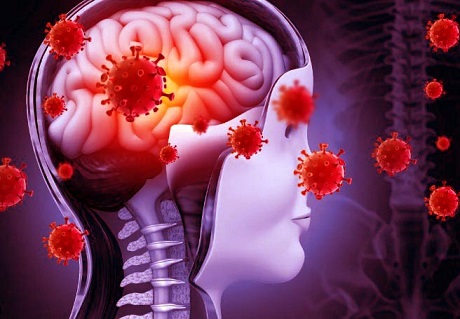SARS-CoV-2 impacts brain’s white matter structure and emotional health in non-hospitalized individuals
Nikhil Prasad Fact checked by:Thailand Medical News Team Aug 06, 2024 1 year, 5 months, 3 weeks, 3 days, 16 hours, 11 minutes ago
COVID-19 News:
Introduction to Post-Acute COVID-19 Syndrome (PACS)
The lingering effects of COVID-19, known as Post-Acute COVID-19 Syndrome (PACS), are becoming a significant health concern worldwide. Even after the initial recovery from COVID-19, many individuals continue to experience a variety of symptoms that persist for months. This
COVID-19 News report delves into the recent findings on how PACS affects the brain's white matter and emotional health, particularly focusing on non-hospitalized individuals.
 SARS-CoV-2 impacts brain’s white matter structure & emotional health in non-hospitalized individuals
The Study and Its Participants
SARS-CoV-2 impacts brain’s white matter structure & emotional health in non-hospitalized individuals
The Study and Its Participants
Researchers from various prestigious institutions, including St. Michael’s Hospital, Unity Health Toronto-Canada, the University of Toronto-Canada, and Sunnybrook Research Institute-Canada, conducted a comprehensive study to understand these effects. The study involved 54 individuals who tested positive for COVID-19 and 14 control subjects who tested negative but had similar symptoms. The participants were assessed about 4-5 months after their COVID-19 tests.
What is White Matter?
White matter in the brain consists of nerve fibers that connect different brain regions, facilitating communication between them. Any damage or changes to this white matter can significantly impact cognitive functions and emotional health.
Key Findings of the Study
The study employed advanced imaging techniques like diffusion magnetic resonance imaging (dMRI) to explore the brain's white matter in detail. Here's what the researchers found:
Altered White Matter Microstructure
The COVID-19 positive group showed significant changes in their brain's white matter compared to the control group. These changes included:
-Reduced Mean and Axial Diffusivity:
The COVID-19 group exhibited reduced mean diffusivity (MD) and axial diffusivity (AD) in their deep white matter. This reduction indicates that the movement of water molecules through the brain tissue was restricted, suggesting potential damage or alterations in the brain's microstructure.
The specific regions affected included the right anterior corona radiata, splenium of the corpus callosum, and right posterior corona radiata. These areas are crucial for various cognitive functions and inter-regional brain communication.
-Increased Mean Kurtosis and Neurite Dispersion:
The study noted increased mean kurtosis (MK) and neurite orientation dispersion index (ODI) in the COVID-19 group's white matter. Kurtosis is a measure of the deviation from normal water diffusion patterns, while neurite dispersion indicates the complexity of neural structures.
These findings suggest that the
white matter in COVID-19 survivors was more complex and disorganized, likely due to inflammation or other post-infection effects.
Emotional Health Impact
Emotional health was a significant focus of this study. The researchers used the NIH emotion toolbox to assess various aspects of emotional well-being, including social satisfaction, overall well-being, and negative affect. Key findings in this area included:
-Higher Levels of Negative Emotions:
Individuals in the COVID-19 group reported higher levels of negative affect, such as sadness, fear, and anger. The study findings highlights that these emotional issues were significantly correlated with the observed changes in white matter. Specifically, the increase in mean kurtosis and the reduction in free water within white matter were linked to higher negative affect scores. This suggests that the structural changes in the brain could be contributing to emotional distress.
-Social Satisfaction and Well-Being:
The study also found that COVID-19 survivors had lower social satisfaction and well-being scores compared to the control group. These aspects of emotional health were intertwined with the structural brain changes, underscoring the comprehensive impact of PACS.
Comprehensive Emotional Sequelae
The emotional impact of PACS extends beyond just negative affect. The study's findings suggest that individuals recovering from COVID-19 face a broad range of emotional challenges:
-Persistent Symptoms and Emotional Health:
The study participants reported various persistent symptoms such as fatigue, headaches, and gastrointestinal issues. These ongoing physical symptoms were found to correlate with emotional health indices. For instance, those who continued to experience headaches or fatigue also tended to report higher levels of negative affect and lower social satisfaction.
-Impact on Daily Life:
The emotional sequelae of PACS can significantly affect individuals' daily lives. The persistent symptoms and emotional distress make it challenging for many to return to their pre-COVID routines, affecting their overall quality of life.
Broader Implications of the Study
This study provides crucial insights into the long-term impacts of COVID-19, particularly for those who were not hospitalized but still suffer from lingering effects. The findings underscore the need for a comprehensive approach to managing PACS that addresses both physical and emotional health.
Recommendations for Future Research
While this study sheds light on the significant impact of PACS on brain structure and emotional health, it also opens the door for further research. Future studies should consider:
-Larger Sample Sizes:
Increasing the number of participants, particularly in the control group, could provide more robust data and further validate these findings.
-Longitudinal Studies:
Conducting long-term studies that follow individuals over several years could help understand the persistent nature of PACS and its evolving impact on brain health and emotional well-being.
-Diverse Populations:
Including a more diverse range of participants, considering factors such as age, gender, and pre-existing health conditions, could provide a more comprehensive understanding of PACS.
Conclusion
The findings from this study highlight the profound impact that COVID-19 can have on the brain and emotional health, even in non-hospitalized individuals. Significant alterations in brain white matter and emotional health issues were observed in those with persistent symptoms post-COVID-19. These results emphasize the importance of continued monitoring and support for COVID-19 survivors to address both their physical and emotional needs.
The study findings were published in the peer-reviewed journal: Frontiers in Neurology.
https://www.frontiersin.org/journals/neurology/articles/10.3389/fneur.2024.1432450/full
For the latest
COVID-19 News, keep on logging to Thailand Medical News.
Read Also:
https://www.thailandmedical.news/news/american-scientists-discover-lower-white-matter-cerebral-blood-flow-in-those-who-have-recovered-from-mild-covid-19
https://www.thailandmedical.news/news/university-of-pennsylvania-mri-study-of-the-brain-alarmingly-shows-that-many-covid-19-patients-exhibit-leukoencephalopathy
https://www.thailandmedical.news/news/one-third-of-all-exposed-to-covid-19-likely-to-develop-cerebral-microbleeds
